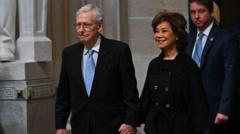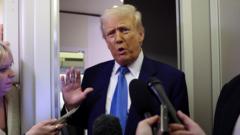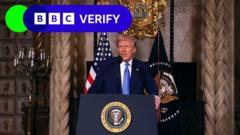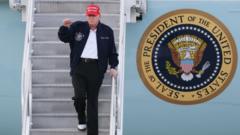In a significant diplomatic meeting held in Saudi Arabia, U.S. Secretary of State Marco Rubio and Russian officials, including Foreign Minister Sergey Lavrov, discussed strategies to end the ongoing conflict in Ukraine and revive economic partnerships. These talks signify a notable shift in the U.S.-Russia relationship, challenging previous policies of isolation and sanctions.
U.S. and Russia Explore New Ties Amid Ukraine Conflict

U.S. and Russia Explore New Ties Amid Ukraine Conflict
High-level discussions between U.S. and Russian officials mark a potential thawing of relations, focusing on Ukraine and economic cooperation.
In a surprising development in international relations, senior officials from the United States and Russia convened in Saudi Arabia to discuss ways to address the ongoing conflict in Ukraine and explore avenues for restoring traditional diplomatic and economic ties. This meeting, characterized by its extensive nature, represents one of the most significant attempts at rapprochement between the two countries in the past several years.
U.S. Secretary of State Marco Rubio led the discussions, which included Russian Foreign Minister Sergey V. Lavrov and encompassed a range of topics beyond the immediate crisis in Ukraine. As diplomatic tensions have escalated since Russia's invasion of Ukraine in 2022, the meeting marks a potential turning point, indicating a willingness from the U.S. to engage constructively with Moscow.
The shifting geopolitical landscape has seen U.S. President Donald Trump advocating for dialogue with Russia, emphasizing a desire to halt ongoing hostilities, a stark contrast to the previous strategies under President Biden that focused heavily on sanctions and military support for Ukraine. After the meeting, U.S. officials positioned Trump's approach as a proactive measure, downplaying Russia's transgressions and commending efforts to communicate directly with the Kremlin.
Looking forward, Rubio outlined plans for continued dialogue with Russia, including discussions on normalizing diplomatic relations between their embassies and exploring new economic partnerships. Russia's delegation hinted that U.S. interests, particularly in the oil sector, could yield substantial financial opportunities, suggesting that American businesses could benefit massively from re-entering the Russian market.
However, notable criticisms emerged from Ukraine. President Volodymyr Zelensky expressed frustration at not being part of the discussions and decided to delay his intended visit to Saudi Arabia in protest. His reaction underscores the complex sentiment surrounding the U.S.-Russia negotiations and the overarching needs and concerns of Ukraine in the backdrop of ongoing aggression.
As these diplomatic efforts evolve, the balance of power and the implications on regional security remain uncertain, with critics monitoring the developments closely to see how the revived relations between the U.S. and Russia might influence the future of the conflict in Ukraine and the broader geopolitical dynamics.























